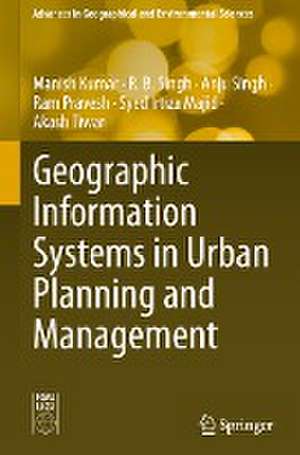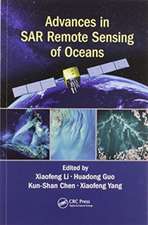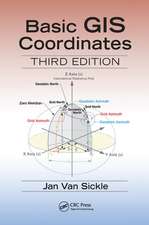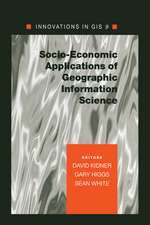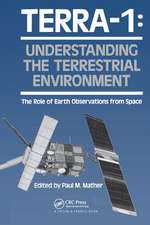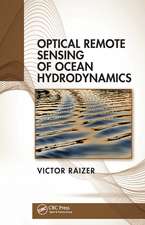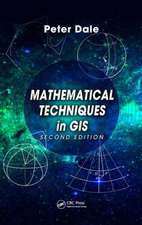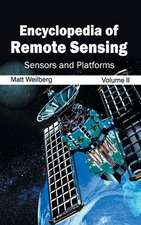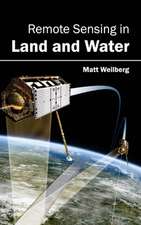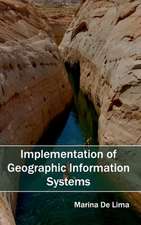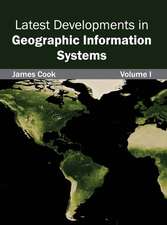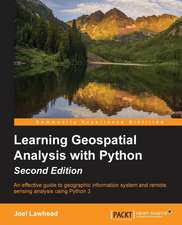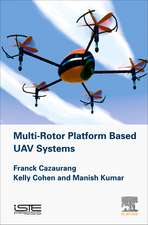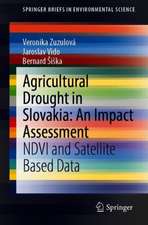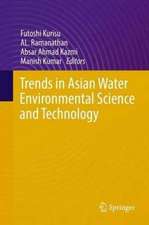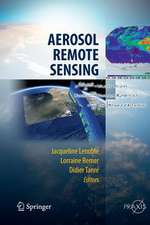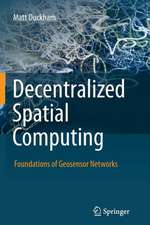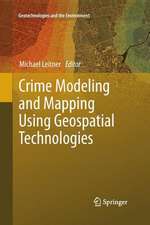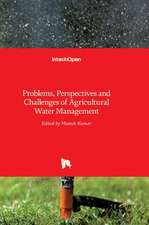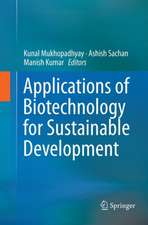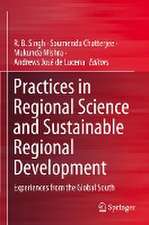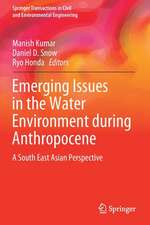Geographic Information Systems in Urban Planning and Management: Advances in Geographical and Environmental Sciences
Autor Manish Kumar, R. B. Singh, Anju Singh, Ram Pravesh, Syed Irtiza Majid, Akash Tiwarien Limba Engleză Hardback – 3 feb 2023
This book contributes to developing scientific knowledge based on geospatial technologies among planners, researchers, scientists, professionals, students, and laymen and providing them with better understanding for urban planning and management at various levels. The book manifests the importance of GIS in better understanding of current urban challenges and provides new insights on how to apply GIS in urban planning. It also encourages the various stakeholders of society to participate in the decision-making process and assists planners and authorities to formulate suitable plans for sustainable urban growth of a region.
The book is divided into two parts. The first part describes thefundamental concepts of GIS and also deals with the advanced techniques of spatial planning. The second part addresses real-world case studies using various applications of GIS. The case studies include urban land-use changes, simulation of future urban growth, urban heat island, alternate landfill site selection and urban flood susceptibility mapping, among others. This book shows how to integrate GIS with remote sensing, geostatistics, artificial intelligence-machine learning techniques, and other cutting-edge technologies. Readers find this book to be an invaluable resource for understanding and solving problems relating to sustainable urban planning and management.
| Toate formatele și edițiile | Preț | Express |
|---|---|---|
| Paperback (1) | 932.52 lei 38-44 zile | |
| Springer Nature Singapore – 3 feb 2024 | 932.52 lei 38-44 zile | |
| Hardback (1) | 1113.89 lei 3-5 săpt. | |
| Springer Nature Singapore – 3 feb 2023 | 1113.89 lei 3-5 săpt. |
Din seria Advances in Geographical and Environmental Sciences
- 18%
 Preț: 968.34 lei
Preț: 968.34 lei - 18%
 Preț: 944.99 lei
Preț: 944.99 lei - 18%
 Preț: 1220.45 lei
Preț: 1220.45 lei - 18%
 Preț: 1020.60 lei
Preț: 1020.60 lei - 15%
 Preț: 640.06 lei
Preț: 640.06 lei - 18%
 Preț: 1117.82 lei
Preț: 1117.82 lei - 18%
 Preț: 1021.55 lei
Preț: 1021.55 lei - 18%
 Preț: 1012.84 lei
Preț: 1012.84 lei - 17%
 Preț: 524.30 lei
Preț: 524.30 lei - 18%
 Preț: 731.10 lei
Preț: 731.10 lei - 18%
 Preț: 948.92 lei
Preț: 948.92 lei - 18%
 Preț: 1011.27 lei
Preț: 1011.27 lei - 18%
 Preț: 956.03 lei
Preț: 956.03 lei - 18%
 Preț: 945.79 lei
Preț: 945.79 lei - 18%
 Preț: 950.52 lei
Preț: 950.52 lei - 18%
 Preț: 959.98 lei
Preț: 959.98 lei - 18%
 Preț: 735.07 lei
Preț: 735.07 lei - 18%
 Preț: 733.03 lei
Preț: 733.03 lei - 18%
 Preț: 891.96 lei
Preț: 891.96 lei - 24%
 Preț: 641.30 lei
Preț: 641.30 lei - 18%
 Preț: 894.46 lei
Preț: 894.46 lei - 18%
 Preț: 1102.03 lei
Preț: 1102.03 lei - 18%
 Preț: 959.98 lei
Preț: 959.98 lei - 18%
 Preț: 971.01 lei
Preț: 971.01 lei - 18%
 Preț: 790.28 lei
Preț: 790.28 lei - 15%
 Preț: 694.87 lei
Preț: 694.87 lei - 18%
 Preț: 893.71 lei
Preț: 893.71 lei - 18%
 Preț: 961.55 lei
Preț: 961.55 lei - 18%
 Preț: 893.71 lei
Preț: 893.71 lei - 18%
 Preț: 1121.76 lei
Preț: 1121.76 lei - 18%
 Preț: 954.45 lei
Preț: 954.45 lei - 18%
 Preț: 956.81 lei
Preț: 956.81 lei - 18%
 Preț: 780.82 lei
Preț: 780.82 lei - 18%
 Preț: 791.88 lei
Preț: 791.88 lei - 18%
 Preț: 894.46 lei
Preț: 894.46 lei - 18%
 Preț: 948.92 lei
Preț: 948.92 lei - 18%
 Preț: 791.88 lei
Preț: 791.88 lei - 15%
 Preț: 642.51 lei
Preț: 642.51 lei - 18%
 Preț: 1017.44 lei
Preț: 1017.44 lei - 18%
 Preț: 780.37 lei
Preț: 780.37 lei -
 Preț: 401.50 lei
Preț: 401.50 lei - 15%
 Preț: 647.27 lei
Preț: 647.27 lei - 24%
 Preț: 821.43 lei
Preț: 821.43 lei - 18%
 Preț: 1232.41 lei
Preț: 1232.41 lei - 24%
 Preț: 683.51 lei
Preț: 683.51 lei
Preț: 1113.89 lei
Preț vechi: 1358.41 lei
-18% Nou
Puncte Express: 1671
Preț estimativ în valută:
213.13€ • 222.55$ • 176.00£
213.13€ • 222.55$ • 176.00£
Carte disponibilă
Livrare economică 25 martie-08 aprilie
Preluare comenzi: 021 569.72.76
Specificații
ISBN-13: 9789811978548
ISBN-10: 9811978549
Pagini: 252
Ilustrații: XVII, 252 p. 115 illus., 51 illus. in color.
Dimensiuni: 155 x 235 mm
Greutate: 0.59 kg
Ediția:1st ed. 2023
Editura: Springer Nature Singapore
Colecția Springer
Seria Advances in Geographical and Environmental Sciences
Locul publicării:Singapore, Singapore
ISBN-10: 9811978549
Pagini: 252
Ilustrații: XVII, 252 p. 115 illus., 51 illus. in color.
Dimensiuni: 155 x 235 mm
Greutate: 0.59 kg
Ediția:1st ed. 2023
Editura: Springer Nature Singapore
Colecția Springer
Seria Advances in Geographical and Environmental Sciences
Locul publicării:Singapore, Singapore
Cuprins
Introduction of Geographic Information System.- Referencing and Coordinate Systems in GIS.- GIS Data Models.- Data Input in GIS.- Data Visualization and Output.- Spatial Data Analysis.- Non-spatial Data Management.- Applications of GIS in Urban Policy/Planning/Management.- Monitoring and Modelling of Urban Land Use Changes.- Simulating Future Urban Growth using Cellular Automata-Markov Chain Models.- Identification of Potential Sites for Housing Development Using GIS Based Multi-Criteria Evaluation Technique.- Urban Green Space Analysis and Potential Site Selection for Green Space Expansion.- A Multi-Criteria Decision Making for Alternative Landfill Site Selections Using Fuzzy TOPSIS Approach.- Urban Flood Susceptibility Modelling of Srinagar using Novel Fuzzy Multi-Layer Perceptron Neural Network (Fuzzy MLPNN).- Assessment, Mapping and prediction of Urban Heat Island.
Notă biografică
Manish Kumar currently works as an assistant professor in the Department of Geography, School of Basic Sciences, Central University of Haryana, Mahendragarh, India. Earlier, from January 2016 to February 2020, he served as an assistant professor in the Department of Geography, Kalindi College, University of Delhi. Prior to that, from January 2009 to December 2014, Dr. Kumar was a lecturer in the M.Sc. remote sensing and GIS course of Kumaun University, Nainital, India. He has also worked as a research associate in the United Nations Development Programme (UNDP) project on “rurbanization”. In addition, he has been a visiting faculty member at the School of Planning and Architecture, Delhi. Dr. Kumar holds a Ph.D. degree from Kumaun University and a postgraduate diploma in remote sensing and GIS from the Indian Institute of Remote Sensing (IIRS) of the Indian Space Research Organisation (ISRO), Dehradun. He is also a steering member of the International Geographical Union (IGU) Commission on Modeling Geographical Systems. He has published more than 25 research papers in various national and international Science Citation Index and Scopus-indexed journals. His special area of research interest includes the application of remote sensing and GIS in urban and regional planning, land use and land cover dynamics, and urban climate change, among others.
R. B. Singh was the secretary general and a treasurer of the International Geographical Union (IGU); a chair of the Council of Scientific and Industrial Research (CSIR)–Central Food Technological Research Institute of the Government of India; a member of the International Council for Science (ICSU); and the ICSU’s scientific committee of Urban Health and Well-Being. He served as a professor and the head of the Department of Geography at the Delhi School of Economics, University of Delhi. Earlier, he was the vice president of the IGU from 2012 to 2018. He was awarded the prestigious Japan Society for the Promotion of Scientific Research Fellowship and has presented papers and chaired sessions in more than 40 countries. He has published 17 books, 45 edited research volumes, and more than 260 research papers. He has supervised 39 Ph.D. and 81 M.Phil. students. In 1988, the United Nations Educational, Scientific and Cultural Organization and the International Social Science Council awarded him research and study grants in social and human sciences. Recently, the Government of India—National Institution for Transforming India (NITI Aayog) (policy think-tank) invited him to join the prestigious committee Vision India 2035.
Anju Singh is currently an associate professor in the Department of Geography, Aditi Mahavidyalaya, University of Delhi. Dr. Singh specializes in the field of climatology, urban geography, environmental studies, coastal ecosystems, and water resource management. She has received international travel grants to present research findings at international forums in Japan. Dr. Singh has published 3 books, including a self-authored one, and more than 15 research papers and articles in edited books and in journals of national and international repute. She is also a member of the prestigious BRICS countries project on satellite validation sponsored by the Department of Science and Technology, Government of India. She has been invited by the National Institute of Open Schooling (NIOS) and the Indira Gandhi National Open University (IGNOU) for preparing reading materials. She is a life member of the National Association of Geographers, India (NAGI), and the Association of Geographical Studies (AGS).
Ram Pravesh is working as a GIS professional. He obtained his B.Sc. Physical Sciences degree from the University of Delhi and his M.Sc. in GIS and remote sensing from Kumaun University, Nainital. His current affiliations include being a senior GIS analyst in MapmyIndia, a leading GIS products and services company on the Indian subcontinent. Mr. Pravesh has expertise in analytics, designing, integrating, and developing GIS processes and databases through various software technology platforms. He has carried out various research projects over the period of his academic and professional careers and has published research papers in peer-reviewed scientific journals. He spends his time doing research, exploring, learning, and developing the thoughts underlying location-based technologies.
Syed Irtiza Majid, a scholar with a commitment to geographical research, is pursuing a doctorate degree in geography at the Central University of Haryana, Mahendragarh, India. From the same institution, he received a master's degree in geography with honors that included a gold medal for outstanding academic performance. He also holds a bachelor's degree in life sciences from the University of Jammu, India. He has received numerous certifications from the Indian Institute of Remote Sensing, Dehradun, and Indian Space Research Organisation’s (ISRO) Space Application Centre, Ahmedabad, in order to further his passion for geospatial technologies (remote sensing and Geographic Information Systems) used for research in the understanding and resolution of contemporary geographic phenomena and problems.
Akash Tiwari is a young researcher and a geographer. He currently works at the Central University of Haryana, India, as a Ph.D. doctoral researcher. He is specialized in the field of ground water hydrology, machine learning techniques, GIS, and remote sensing. He has been selected for the Junior Research Fellowship, Innovation in Science Pursuit for Inspired Research (INSPIRE) Fellowship, and Science Talent Search Scholarship. He is an alumnus of Banaras Hindu University, Varanasi, and the University of Allahabad, Prayagraj.
R. B. Singh was the secretary general and a treasurer of the International Geographical Union (IGU); a chair of the Council of Scientific and Industrial Research (CSIR)–Central Food Technological Research Institute of the Government of India; a member of the International Council for Science (ICSU); and the ICSU’s scientific committee of Urban Health and Well-Being. He served as a professor and the head of the Department of Geography at the Delhi School of Economics, University of Delhi. Earlier, he was the vice president of the IGU from 2012 to 2018. He was awarded the prestigious Japan Society for the Promotion of Scientific Research Fellowship and has presented papers and chaired sessions in more than 40 countries. He has published 17 books, 45 edited research volumes, and more than 260 research papers. He has supervised 39 Ph.D. and 81 M.Phil. students. In 1988, the United Nations Educational, Scientific and Cultural Organization and the International Social Science Council awarded him research and study grants in social and human sciences. Recently, the Government of India—National Institution for Transforming India (NITI Aayog) (policy think-tank) invited him to join the prestigious committee Vision India 2035.
Anju Singh is currently an associate professor in the Department of Geography, Aditi Mahavidyalaya, University of Delhi. Dr. Singh specializes in the field of climatology, urban geography, environmental studies, coastal ecosystems, and water resource management. She has received international travel grants to present research findings at international forums in Japan. Dr. Singh has published 3 books, including a self-authored one, and more than 15 research papers and articles in edited books and in journals of national and international repute. She is also a member of the prestigious BRICS countries project on satellite validation sponsored by the Department of Science and Technology, Government of India. She has been invited by the National Institute of Open Schooling (NIOS) and the Indira Gandhi National Open University (IGNOU) for preparing reading materials. She is a life member of the National Association of Geographers, India (NAGI), and the Association of Geographical Studies (AGS).
Ram Pravesh is working as a GIS professional. He obtained his B.Sc. Physical Sciences degree from the University of Delhi and his M.Sc. in GIS and remote sensing from Kumaun University, Nainital. His current affiliations include being a senior GIS analyst in MapmyIndia, a leading GIS products and services company on the Indian subcontinent. Mr. Pravesh has expertise in analytics, designing, integrating, and developing GIS processes and databases through various software technology platforms. He has carried out various research projects over the period of his academic and professional careers and has published research papers in peer-reviewed scientific journals. He spends his time doing research, exploring, learning, and developing the thoughts underlying location-based technologies.
Syed Irtiza Majid, a scholar with a commitment to geographical research, is pursuing a doctorate degree in geography at the Central University of Haryana, Mahendragarh, India. From the same institution, he received a master's degree in geography with honors that included a gold medal for outstanding academic performance. He also holds a bachelor's degree in life sciences from the University of Jammu, India. He has received numerous certifications from the Indian Institute of Remote Sensing, Dehradun, and Indian Space Research Organisation’s (ISRO) Space Application Centre, Ahmedabad, in order to further his passion for geospatial technologies (remote sensing and Geographic Information Systems) used for research in the understanding and resolution of contemporary geographic phenomena and problems.
Akash Tiwari is a young researcher and a geographer. He currently works at the Central University of Haryana, India, as a Ph.D. doctoral researcher. He is specialized in the field of ground water hydrology, machine learning techniques, GIS, and remote sensing. He has been selected for the Junior Research Fellowship, Innovation in Science Pursuit for Inspired Research (INSPIRE) Fellowship, and Science Talent Search Scholarship. He is an alumnus of Banaras Hindu University, Varanasi, and the University of Allahabad, Prayagraj.
Textul de pe ultima copertă
Geographic Information Systems (GIS) play a pivotal role in the field of urban planning and management and provide better solutions for numerous urban problems. With GIS, one has the ability to better understand existing requirements of a city and its design to fulfill those needs.
This book contributes to developing scientific knowledge based on geospatial technologies among planners, researchers, scientists, professionals, students, and laymen and providing them with better understanding for urban planning and management at various levels. The book manifests the importance of GIS in better understanding of current urban challenges and provides new insights on how to apply GIS in urban planning. It also encourages the various stakeholders of society to participate in the decision-making process and assists planners and authorities to formulate suitable plans for sustainable urban growth of a region.
The book is divided into two parts. The first part describes thefundamental concepts of GIS and also deals with the advanced techniques of spatial planning. The second part addresses real-world case studies using various applications of GIS. The case studies include urban land-use changes, simulation of future urban growth, urban heat island, alternate landfill site selection and urban flood susceptibility mapping, among others. This book shows how to integrate GIS with remote sensing, geostatistics, artificial intelligence-machine learning techniques, and other cutting-edge technologies. Readers find this book to be an invaluable resource for understanding and solving problems relating to sustainable urban planning and management.
This book contributes to developing scientific knowledge based on geospatial technologies among planners, researchers, scientists, professionals, students, and laymen and providing them with better understanding for urban planning and management at various levels. The book manifests the importance of GIS in better understanding of current urban challenges and provides new insights on how to apply GIS in urban planning. It also encourages the various stakeholders of society to participate in the decision-making process and assists planners and authorities to formulate suitable plans for sustainable urban growth of a region.
The book is divided into two parts. The first part describes thefundamental concepts of GIS and also deals with the advanced techniques of spatial planning. The second part addresses real-world case studies using various applications of GIS. The case studies include urban land-use changes, simulation of future urban growth, urban heat island, alternate landfill site selection and urban flood susceptibility mapping, among others. This book shows how to integrate GIS with remote sensing, geostatistics, artificial intelligence-machine learning techniques, and other cutting-edge technologies. Readers find this book to be an invaluable resource for understanding and solving problems relating to sustainable urban planning and management.
Caracteristici
Includes fundamentals of GIS and real-world case studies relating to contemporary urban challenges in one book Presents case studies to showcase major urban issues and problems with their solutions by geospatial techniques Demonstrates GIS integration with remote sensing, geo-statistics and other modern technologies
